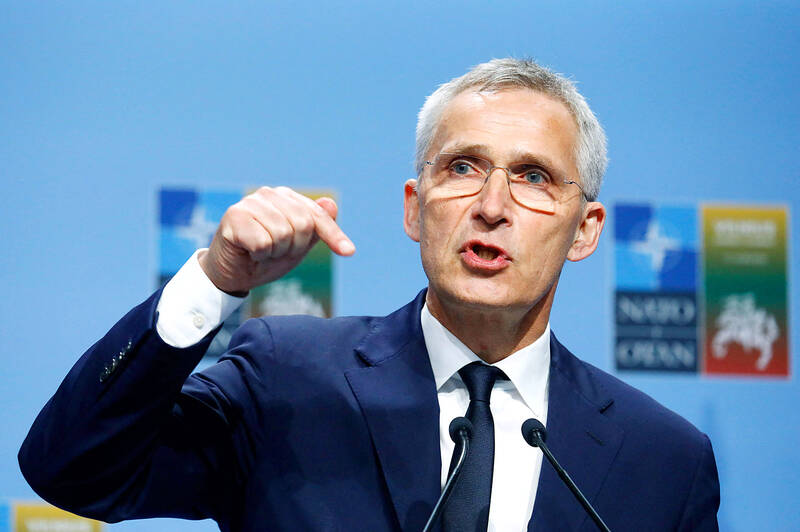In a strongly worded communique, NATO on Tuesday accused China of challenging the bloc’s interests and security, eliciting an angry response from Beijing.
In a communique issued midway into a two-day summit in the Lithuanian capital, Vilnius, NATO said that the People’s Republic of China (PRC) challenged its interests, security and values with its “ambitions and coercive policies.”
“The PRC employs a broad range of political, economic, and military tools to increase its global footprint and project power, while remaining opaque about its strategy, intentions and military build-up,” NATO heads of state said in the communique.

Photo: AFP
“The PRC’s malicious hybrid and cyber operations and its confrontational rhetoric and disinformation target Allies and harm Alliance security,” the communique said.
The Chinese mission to the EU said in a statement that the China-related content of the communique disregarded basic facts, distorted China’s position and policies, and deliberately discredited China.
“We firmly oppose and reject this,” it said.
NATO Secretary-General Jens Stoltenberg told reporters at the summit that while China was not a NATO “adversary,” it was increasingly challenging the rules-based international order with its “coercive behavior.”
“China is increasingly challenging the rules-based international order, refusing to condemn Russia’s war against Ukraine, threatening Taiwan and carrying out a substantial military buildup,” he said.
However, NATO made no mention of Taiwan in its communique.
Taiwan’s Ministry of Foreign Affairs said it was “very meaningful” for Stoltenberg to once again clearly express his concern for security in the Taiwan Strait.
Taiwan is a responsible, democratic member of the Indo-Pacific region, and is willing to work with like-minded partners such as Europe and the US to jointly combat coercion by and challenges from authoritarian regimes, it added.
Japanese Prime Minister Fumio Kishida, joining for a second time, aimed to remind the military alliance to pay heed to East Asia risks, while South Korean President Yoon Suk-yeol sought deeper international security cooperation amid rising North Korean threats and tension over China.
In May, Kishida said that Japan had no plans to become a NATO member, even though NATO was planning a Tokyo office, its first in Asia, to facilitate consultations in the region.
The Chinese mission said China resolutely opposed NATO’s “eastward movement into the Asia-Pacific region” and said that any action threatening Beijing’s rights would be met with a resolute response.
“Any act that jeopardizes China’s legitimate rights and interests will be met with a resolute response,” it said.
In the communique, NATO said that China sought to control key technological and industrial sectors, critical infrastructure, and strategic materials and supply chains, and that Beijing also used its economic leverage to create strategic dependencies and enhance its influence.

Shamans in Peru on Monday gathered for an annual New Year’s ritual where they made predictions for the year to come, including illness for US President Donald Trump and the downfall of Venezuelan President Nicolas Maduro. “The United States should prepare itself because Donald Trump will fall seriously ill,” Juan de Dios Garcia proclaimed as he gathered with other shamans on a beach in southern Lima, dressed in traditional Andean ponchos and headdresses, and sprinkling flowers on the sand. The shamans carried large posters of world leaders, over which they crossed swords and burned incense, some of which they stomped on. In this

Indonesia yesterday began enforcing its newly ratified penal code, replacing a Dutch-era criminal law that had governed the country for more than 80 years and marking a major shift in its legal landscape. Since proclaiming independence in 1945, the Southeast Asian country had continued to operate under a colonial framework widely criticized as outdated and misaligned with Indonesia’s social values. Efforts to revise the code stalled for decades as lawmakers debated how to balance human rights, religious norms and local traditions in the world’s most populous Muslim-majority nation. The 345-page Indonesian Penal Code, known as the KUHP, was passed in 2022. It

Near the entrance to the Panama Canal, a monument to China’s contributions to the interoceanic waterway was torn down on Saturday night by order of local authorities. The move comes as US President Donald Trump has made threats in the past few months to retake control of the canal, claiming Beijing has too much influence in its operations. In a surprising move that has been criticized by leaders in Panama and China, the mayor’s office of the locality of Arraijan ordered the demolition of the monument built in 2004 to symbolize friendship between the countries. The mayor’s office said in

‘TRUMP’S LONG GAME’: Minnesota Governor Tim Walz said that while fraud was a serious issue, the US president was politicizing it to defund programs for Minnesotans US President Donald Trump’s administration on Tuesday said it was auditing immigration cases involving US citizens of Somalian origin to detect fraud that could lead to denaturalization, or revocation of citizenship, while also announcing a freeze of childcare funds to Minnesota and demanding an audit of some daycare centers. “Under US law, if an individual procures citizenship on a fraudulent basis, that is grounds for denaturalization,” US Department of Homeland Security Assistant Secretary Tricia McLaughlin said in a statement. Denaturalization cases are rare and can take years. About 11 cases were pursued per year between 1990 and 2017, the Immigrant Legal Resource